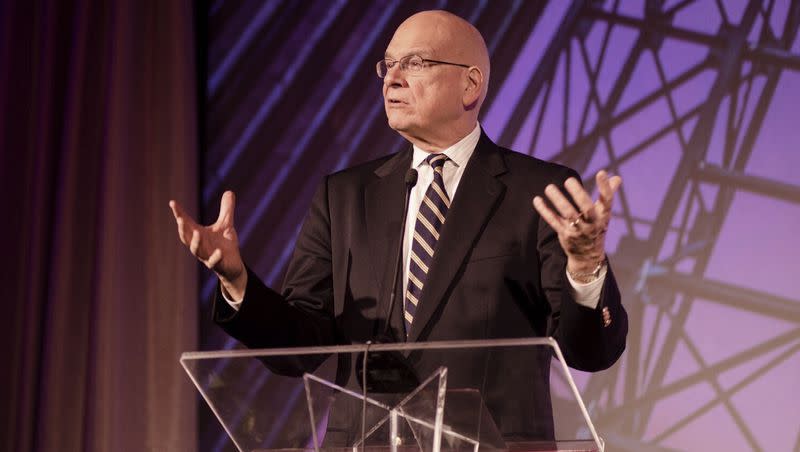Timothy Keller — the pastor who lifted New York City’s eyes to God — dies at 72

- Oops!Something went wrong.Please try again later.
- Oops!Something went wrong.Please try again later.
In the classic plot line of every hero’s journey, often when it dawns on the story’s would-be hero just how dire the odds are against the quest, a trusted guide appears. This key but often unprepossessing character has the hard-won wisdom of learning and experience that offers a realistic albeit difficult path forward against the impossible odds. Think of Yoda’s guidance to Luke Skywalker in “Star Wars”, or Strider on Frodo’s journey to Rivendell in “Lord of the Rings.”
On Friday, Christianity in America lost one of its most important trusted guides, Tim Keller, the founding pastor of Redeemer Presbyterian Church in New York City.
As a pastor and as the author of some 30 books, Keller served as a trusted mentor to an entire generation of would-be Christian heroes who face the difficult odds of preserving their Christ-centered discipleship without succumbing to the secularism of contemporary Western culture and the idolatry of money, career, sex and power.
Keller had the audacity to start a conservative biblically based Christian church in Manhattan in 1989. From a few dozen congregants, Redeemer Presbyterian Church has grown into a megachurch for thousands of Manhattanites, many of them upwardly mobile young professionals in finance, law, journalism, publishing and the arts — the very demographic within the clutches of secular culture that has generally been stepping away from the pews.
So how did Keller attract and keep this kind of congregation?
Based on my interactions with Keller, it wasn’t his charisma. Affable enough, I never saw Keller appeal to emotion and rhetorical flourish. Rather, he recognized the importance of intellectually engaging his educated parishioners, never talking down, never pandering. His was a rational exposition of the gospel that helped people to integrate their faith, their reason and their daily work.
Nor was it soft-pedaling hard doctrines. Keller didn’t compromise on his orthodox protestant theology. Keller asserted the authority of scripture over reason and experience, the necessity of a conversion experience, the belief that salvation comes through faith in the grace offered by Jesus Christ’s sacrifice on the cross rather than through works, the necessity of sharing the gospel with others, and the reality of the miraculous — especially the literal resurrection of Jesus Christ.
I first met Keller a decade ago at a conference where he presented his thoughts to a group of seasoned journalists about conservative Christianity in contemporary society, and at least three things became apparent to me about his appeal.
First and foremost, he clearly had an immovable witness of the divinity of Jesus Christ and his central role in the salvation of humankind. From that bedrock belief sprung a willingness to put Christian teachings up against all other world views — not in a triumphalist way, but as testable hypotheses. Which way of living would bring lasting joy — one that celebrated individual expression and the pursuit of pleasure as life’s ends, or one that celebrated devotion to God, obedience to revealed strictures, and ministry to the poor and the needy? He was willing to treat it as an empirical question.
Second, he focused on principles instead of politics. He understood that his conservative theology had implications for social choices, but if I understood him correctly, he saw political power as a temptation rather than a prize. To Keller, Christ’s admonition to “render unto Caesar what is Caesar’s” was a rejection of triumphalism.
Finally, he understood that institutional design matters and that successful institutions adapt to important cultural narratives. He wanted to create, within his congregation, real communities — but he emphasized that in 21st century New York, that ironically meant taking seriously the fact that Americans see themselves as individualists.
Recognizing that brought an entirely different approach to church authority. Keller said, “there needs to be more transparency, more communication, more persuasion, but you can still have authority, but it has to be wielded in a very different way. The churches have to be much more joyful, not just dour. The churches also have to not beat up on other churches. There are a whole lot of ways in which you can create communities that appeal to individualistic people and still be communities. But it’s still a struggle”.
In the final years of his life I had the distinct honor of interacting with Keller and some of his fellow thought leaders within America’s religious communities via Zoom. Even over Zoom, Tim had a presence that drew people to him. His powerful intellect and his mastery of his craft combined in a way that exuded earned authority. And he always honored the agency and intellect of his interlocutors. He would carefully distinguish between his own speculation and what he considered well-honed argumentation — presenting his reasons with clarity, with transparency, and with love.
Religion writ-large as an institution in America faces significant challenges, internally and externally. For those of us who recognize religion’s value as a repository for meaning, as a school for moral sense, and as an incubator of community, we would do well to consider Tim Keller’s life and ministry. His commitment to core truths while being adaptive organizationally has much to teach us as we collectively navigate the corrosive effects to faith from atomistic individualism and secularism.
At a memorial service in 2011 for the great British cleric John Stott, Keller closed his remembrance by admonishing the congregation, while mourning Stott’s passing, to “be empowered by the knowledge of his present glory.” Tim Keller’s hard won learning and experience have given me needed guidance and I will miss his wisdom and grace. But his own personal testimony of the resurrection has empowered me as I acknowledge his present peace and glory. Rest in peace.
Paul S. Edwards is the director of the Wheatley Institute at Brigham Young University.

